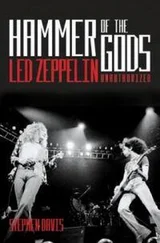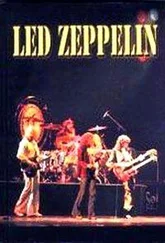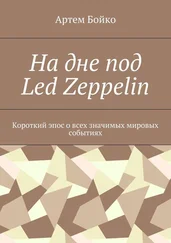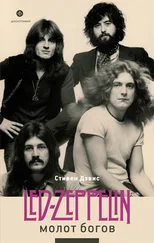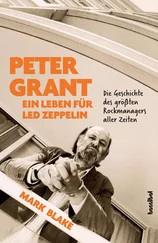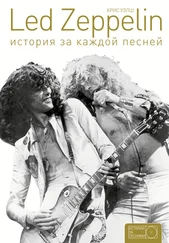The Lost Chronicles of
Led Zeppelin’s 1975
American Tour
Stephen Davis
FOURTH ESTATE - London
Cover
Title Page LZ-’75 The Lost Chronicles of Led Zeppelin’s 1975 American Tour Stephen Davis FOURTH ESTATE - London
Prologue
CHAPTER 1 Cold Might on Boone’s Farm
CHAPTER 2 Key to the Highway
CHAPTER 4 Vision of the Future
CHAPTER 4 A Giant Hug for Led Zeppelin
CHAPTER 5 He Cried Twice That Night
CHAPTER 6 Hell-Bent for Valhalla
CHAPTER 7 A Complex Die-Cut Affair
CHAPTER 8 The True Pride of Led Zeppelin
CHAPTER 9 Expansive Spiritual Vistas
CHAPTER 10 Savant of the Occult
CHAPTER 11 Lap of Honor
CHAPTER 12 Journey to Middle Earth
CHAPTER 13 Hot Tea with Lemon, Please
CHAPTER 14 Aware of the Energies
CHAPTER 15 The Magus of Franklin Street
CHAPTER 16 Drones and Cones of White Noise
CHAPTER 17 A Spiritual Quest
CHAPTER 18 In Our Glory
CHAPTER 19 Little Red Corvette
CHAPTER 20 The Smiling Dog Saloon
CHAPTER 21 Letter from a Fan
CHAPTER 22 Abrupt Change of Weather
CHAPTER 23 The Pipes of Pan in L.A.
CHAPTER 24 The Loud Drummer
CHAPTER 25 A Spiraling Vortex
CHAPTER 26 Dionysus in San Diego
CHAPTER 27 The Prairie Princess
CHAPTER 28 The Golden God
CHAPTER 29 Access All Areas
CHAPTER 30 The Application of Attitude
CHAPTER 31 Tomorrow Will Be Too Late
CHAPTER 32 Little Sister
CHAPTER 33 Cherry Bombs and Toilet Paper
CHAPTER 34 A Town of Great Fishermen
CHAPTER 35 Transmitter of the Gods
CHAPTER 36 Hardest Core Rock
CHAPTER 37 The Exiles Return
CHAPTER 38 The Hard Road to Presence
CHAPTER 39 Clean and Purifying Riffs
Epilogue
Acknowledgments
Copyright
About the Publisher
Led Zeppelin rarely let journalists anywhere near the band. Shortly after guitarist Jimmy Page founded the English rock group in 1968, relations with the press deteriorated to the point of outright hostility on both sides. Early reviews of Led Zeppelin’s recordings and concerts were negative, unkind, and even vitriolic. Led Zeppelin was described as an unholy amalgam of hype, money, depravity, and Satanism. The band retaliated by banning writers and photographers from their shows, with the exception of a few trusted people who could be counted on to write positive articles and make authorized, band-approved photographs. There were also reliable accounts of journalists being assaulted by members of Led Zeppelin; being spat on; having drinks flung in their faces.
“The press,” as it was known, was terrified of Led Zeppelin. All this changed, somewhat, in 1975. By then, Led Zeppelin was the biggest, highest-grossing rock band in the world, as well as the booming music industry’s biggest act. The records shipped platinum. The tours sold out in moments. Zeppelin started a record label, and the products started selling tonnage as well.
But in 1975, the mainstream media didn’t play along. The rock press was eager for any piece of Led Zeppelin, but as the band prepared a new album of songs, maybe its best ever, and a sold-out tour of North America, the band’s media representatives found certain doors slamming shut and important phone calls unreturned. So it was decided that Led Zeppelin would take the unprecedented step of inviting carefully selected writers, editors, and photographers from the regular media to come along for a taste of the tour from the inside. Backstage passes would be doled out, interviews would be given, a tour photographer was hired. Rolling Stone magazine, hated by Led Zeppelin for unfair treatment since 1969, would be courted. An elite from this small constituency would even be offered the occasional seat on “Starship One,” Led Zeppelin’s flying gin palace, a converted Boeing 727 jetliner, as it ferried the musicians in excelsis, across time zones, state lines, and states of mind.
I was one of those writers.
Between January and March 1975, I covered Led Zeppelin’s tenth American tour, as a magazine journalist. I was well treated by the band, its management, and the road crew, and the whole thing was an adventure. Led Zeppelin paid for everything. I heard a lot of great music, and also witnessed concerts that were far less than brilliant, illustrating how a long, hard-fought rock campaign could be undermined by illness, exile, homesickness, weather, drugs, and alcohol. In other words, I saw that the current gods of rock were mere mortals after all.
While I was on duty in 1975, I kept three notebooks detailing the daily progress of the Zeppelin tour as I was covering it. Some entries were more personal, sketching characters I met, and various situations and experiences. On the notebook’s covers I scribbled LZ- ‘75. After I wrote my article, I put the LZ-’75 notebooks in a drawer and forgot about them.
Jump ten years to 1985. I’d been searching for the LZ-’75 notebooks for two years because I was writing a biography of Led Zeppelin, which had disbanded five years earlier after drummer John Bonham died. But I’d moved houses, and the notebooks had been misplaced. I had a few details of that period—Zeppelin’s most important North American tour—from the manuscript of the old magazine article, but most of the in-the-moment, on-the-road 1975 incidents from my notes were absent from Hammer of the Gods: The Led Zeppelin Saga, which nonetheless became an international best seller when it was published in 1985. (I think this happened mostly because, at the time, there was so little available information about Led Zeppelin’s twelve-year career. There were no Zeppelin videos on early MTV, and although Robert Plant remained active, he didn’t play any of the old songs in concert. In the sudden and complete vanishing of Led Zeppelin after 1980, as if a malign spirit had been banished from the world, millions of rock fans had become obsessed by the legendary band’s raw power, addictive charisma, and hellacious mystique.)
Another ten-year jump, to 1995. I was traveling with Aerosmith while collaborating on the band’s autobiography. One night in Buenos Aires, Jimmy Page asked Joe Perry to give the induction speech marking Led Zeppelin’s entry into the Rock and Roll Hall of Fame that year. Joe enlisted bandmate Steven Tyler to share the speech, and asked me to write it. Joe said he wanted some new material about Led Zeppelin, not a rewrite of Hammer of the Gods. Again I searched for the elusive LZ-’75 notebooks, but they were still missing. Somehow, though, I knew they weren’t gone, only hiding. I ended up with a speech about Aerosmith’s early and slavish appreciation of Zeppelin, voiced by the principals themselves. Steven Tyler, who had begun his career as a drummer, choked up during his tribute to John Bonham. After the evening’s speeches, there was one hell of a rock jam in the Waldorf-Astoria ballroom that night.
Ten years after that, in 2005, I finally found the LZ-’75 notebooks. It had been three decades since I had covered Led Zeppelin. The notebooks were in a veritable cardboard 1975 time capsule that also preserved some eight-track tapes, the keys to my old BMW, a ceramic bong, six C-90 tape cassettes of interviews, a thick file of news clippings, Polaroid snapshots and several (now archaic) photographic contact sheets, press releases from the Led Zeppelin office, unused concert tickets, New York subway tokens, a cocktail napkin from the Continental Hyatt House in West Hollywood with scribbled phone numbers, various Zeppelin backstage passes, a letter from William S. Burroughs, a goatskin Moroccan kif pouch, and a bundle of teenage fan mail to Led Zeppelin, all dated 1975.
Читать дальше


![Мик Уолл - Когда титаны ступали по Земле - биография Led Zeppelin[When Giants Walked the Earth - A Biography of Led Zeppelin]](/books/79443/mik-uoll-kogda-titany-stupali-po-zemle-biografiya-thumb.webp)


